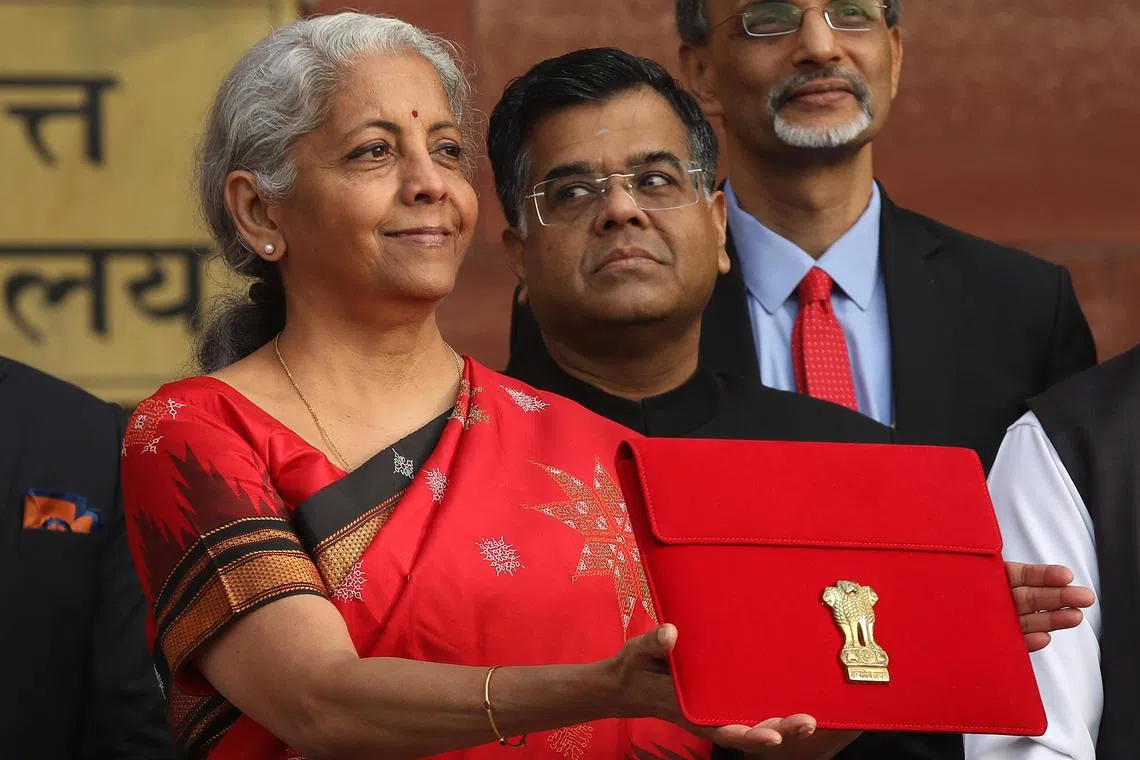India unveils pro-growth budget with pre-election sweeteners
Sign up now: Get insights on Asia's fast-moving developments

Indian Finance Minister Nirmala Sitharaman announced an increase on capital spending, keeping with the strategy of the government spending to create jobs.
PHOTO: EPA-EFE
NEW DELHI - India on Wednesday unveiled a pre-election budget aimed at boosting growth and creating jobs while extending personal tax reliefs in the run-up to a clutch of state elections and the general election in 2024.
In the last full budget ahead of elections in 2024 when Prime Minister Narendra Modi will seek a third term in power, the government unveiled plans to increase infrastructure spending to boost growth.
Finance Minister Nirmala Sitharaman announced an increase in capital spending by 33 per cent to 10 trillion rupees (S$160 billion), keeping with the strategy of the government spending to create jobs.
She said the government had identified 100 critical transport infrastructure projects for last-mile connectivity, including to ports, and 53 billion rupees have been allocated for an irrigation project for drought areas in Karnataka, which is heading to state elections.
Railway projects saw a 48 per cent increase in allocation to 2.4 trillion rupees.
Agriculture will get a boost from various initiatives, including the setting up of an accelerator fund for agri start-ups to push the latest technology.
“This substantial increase in recent years is central to the government’s efforts to enhance growth potential and job creation, crowd-in private investments, and provide a cushion against global headwinds,” Ms Sitharaman told Parliament.
“After a subdued period of the (Covid-19) pandemic, private investments are growing again.”
She said the government has a budget deficit target of 5.9 per cent of gross domestic product for 2023/24, as opposed to 6.4 per cent for the current fiscal year.
More funds were allocated to a public housing scheme, with an increase of 66 per cent to 790 billion rupees, and the setting up of 157 nursing colleges and a national digital library for children.
Ms Sitharaman announced a range of income tax cuts, including raising the income tax rebate limit from 500,000 rupees to 700,000 rupees. This means those earning up to 700,000 rupees will not have to pay income tax.
She added that someone who earns 900,000 rupees annually will now have to pay a tax of 45,000 rupees instead of 60,000 rupees.
Tax on those in the top income bracket was also reduced from 42.7 per cent to 39 per cent.
Many corporates hailed the budget as “pro-growth”, with markets initially responding positively to the announcements, but remaining turbulent till the end of trading.
Mr Modi said that the budget was aimed at fulfilling the aspirations of farmers and the middle class, among others, saying: “This year’s budget infuses new energy to India’s development trajectory.”
However, some economists cautioned that timely implementation of projects is key to boosting growth.
“Last year, the capital expenditure was lower than the budget estimates by 3 per cent. Those investments are critical for growth and employment generation, and implementation is key,” said economist Biswajit Dhar.
He noted that the tax cuts could boost consumption, provided inflation is reined in.
“If inflation is taken care of, then of course some of the tax cuts could be converted into higher consumer demand,” Prof Dhar said, adding that consumer demand is yet to recover in the South Asian country.
The government’s Economic Survey released on Tuesday also highlighted the risks of an “entrenched inflation” and a “depreciating rupee” hit by global headwinds.
Retail inflation stood at 5.72 per cent in December, down slightly from 5.88 per cent in the previous month.
Still, the International Monetary Fund on Monday said India is in a “bright spot”, pegging its growth at 6.8 per cent this fiscal year even as it forecast that global growth will decline from 3.4 per cent in 2022 to 2.9 per cent in 2023.
However, some opposition politicians have criticised the government for not unveiling more measures for the poor.
The Congress party criticised the budget for not offering more to the poor and addressing growing inequities.
“The budget shows that the government is not bothered about the people and their concerns about lives and livelihood and growing inequality between the rich and poor,” said Congress leader P. Chidambaram, adding that the income tax reliefs were a “minor relief”.
Unemployment is a growing problem for the country, where half the population is below the age of 30.
The unemployment rate was 8.3 per cent in December,



